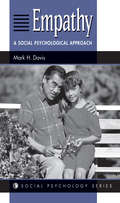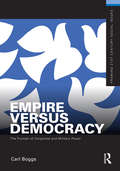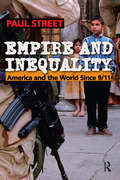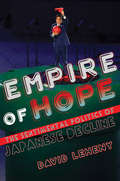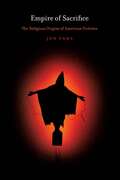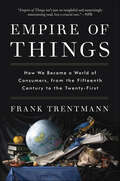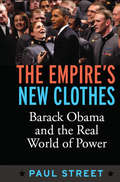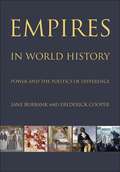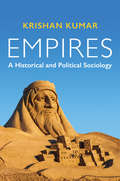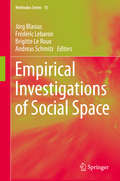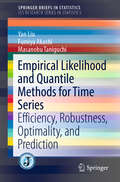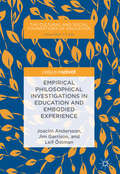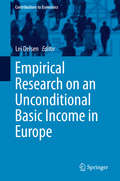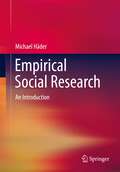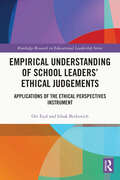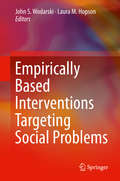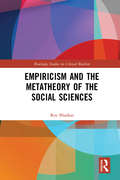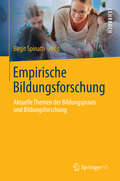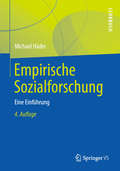- Table View
- List View
Empathy: A Social Psychological Approach
by Mark H DavisEmpathy has long been a topic of interest to psychologists, but it has been studied in a sometimes bewildering number of ways. In this volume, Mark Davis offers a thorough, evenhanded review of contemporary empathy research, especially work that has been carried out by social and personality psychologists.Davis' approach is explicitly multidimensional. He draws careful distinctions between situational and dispositional “antecedents” of empathy, cognitive and noncognitive “internal processes,” affective and nonaffective “intrapersonal outcomes,” and the “interpersonal behavioral outcomes” that follow. Davis presents a novel organizational model to help classify and interpret previous findings. This book will be of value in advanced undergraduate and graduate courses on altruism, helping, and moral development.
Empire Versus Democracy: The Triumph of Corporate and Military Power (Framing 21st Century Social Issues)
by Carl BoggsIn Empire Versus Democracy, Carl Boggs traces the authoritarian trajectory of American politics since World War II, with emphasis on the growing concentration of corporate and military power that has accompanied the United States assumption of leading superpower on the world scene. The rise of the U.S. as unchallenged imperial nation has meant the steady expansion of a permanent war economy and security state that, working in tandem with large business interests, has led to proliferation of American armed-forces bases around the world, recurrent military interventions, swollen government bureaucracy, massive public expenditures, heavy reliance on surveillance and secrecy, and diminished resources for social infrastructure and social programs. Boggs shows that, as in the case of the Roman and other previous empires, enlargement of U.S. imperial power has resulted in a decline of civic engagement and local participation along with skewed priorities favoring the war economy and security state. Inevitably, this has meant a weakening of electoral and legislative politics, overwhelmed by the centers of enormous wealth and power. The goal of this new, unique Series is to offer readable, teachable "thinking frames" on today’s social problems and social issues by leading scholars, all in short 60 page or shorter formats, and available for view on http://routledge.customgateway.com/routledge-social-issues.html For instructors teaching a wide range of courses in the social sciences, the Routledge Social Issues Collection now offers the best of both worlds: originally written short texts that provide "overviews" to important social issues as well as teachable excerpts from larger works previously published by Routledge and other presses.
Empire and Inequality: America and the World Since 9/11
by Paul Street"This is an impressive collection: well-informed, well-written, covering highly important topics over an impressive range, with no hesitation about taking an honest stand that gets right to the heart of the matter in case after case." Noam Chomsky A frequent columnist in Z magazine, Black Commentator, and other magazines, Paul Street has closely monitored the deterioration of civil liberties since 9/11. In his new book, Street challenges the widely accepted notion that 'everything changed' on 9/11. The event of 9/11 changed the lives of thousands of people in tragic and lasting ways, but some things it did not drastically alter were the long-term goals of the Bush administration. Rather, the terrorist attacks offered a way for them to fully realize these goals, through waging war against fictional enemies abroad and against civil liberties at home. By pointing out rampant injustices in society and doggedly pursuing the blatant contradictions in current government policies, Street reveals a very different America than the government or media portray. Empire and Inequality shows how the jetliner attacks provided a windfall opportunity to accelerate pre-existing trends towards greater global and domestic hierarchy, inequality, and repression. Street shows how the elites of American government and business used classic propaganda mechanisms in pursuit of this regressive and authoritarian agenda in the "post-9/11 era." Street offers a cogent critique of the myth of the powerless state, showing that U.S. government's cup runs over when it comes to serving the wealthy and privileged few and is empty only when it comes to meeting the needs of the non-affluent majority. Empire and Inequality is a powerful reflection on the inseparable, deepening, and mutually reinforcing relationships that exist between empire abroad and inequality and repression at home in the "post 9/11 era."
Empire of Hope: The Sentimental Politics of Japanese Decline
by David LehenyEmpire of Hope asks how emotions become meaningful in political life. In a diverse array of cases from recent Japanese history, David Leheny shows how sentimental portrayals of the nation and its global role reflect a durable story of hopefulness about the country's postwar path. From the medical treatment of conjoined Vietnamese children, victims of Agent Orange, the global promotion of Japanese popular culture, a tragic maritime accident involving a US Navy submarine, to the 2011 tsunami and nuclear disaster, this story has shaped the way in which political figures, writers, officials, and observers have depicted what the nation feels.Expressions of national emotion do several things: they construct the boundaries of the national body, they inform and discipline appropriate expression, and they depoliticize messy problems that threaten to produce divisive questions about winners and losers. Most important, they work because they appear to be natural, simple and expected expressions of how the nation shares feeling, even when they paper over the extraordinary divergence in how the nation's citizens experience each incident. In making its arguments, Empire of Hope challenges how we read the relations between emotion and politics by arguing—unlike those who build from the neuroscientific turn in the social sciences or those developing affect theory in the humanities—that the focus should be on emotional representation rather than on emotion itself.
Empire of Sacrifice: The Religious Origins of American Violence
by Jon PahlIt is widely recognized that American culture is both exceptionally religious and exceptionally violent. Americans participate in religious communities in high numbers, yet American citizens also own guns at rates far beyond those of citizens in other industrialized nations. Since 9/11, United States scholars have understandably discussed religious violence in terms of terrorist acts, a focus that follows United States policy. Yet, according to Jon Pahl, to identify religious violence only with terrorism fails to address the long history of American violence rooted in religion throughout the country’s history. In essence, Americans have found ways to consider blessed some very brutal attitudes and behaviors both domestically and globally.In Empire of Sacrifice, Pahl explains how both of these distinctive features of American culture work together by exploring how constructions along the lines of age, race, and gender have operated to centralize cultural power across American civil or cultural religions in ways that don’t always appear to be "religious" at all. Pahl traces the development of these forms of systemic violence throughout American history, using evidence from popular culture, including movies such as Rebel without a Cause and Reefer Madness and works of literature such as The Narrative of the Life of Frederick Douglass and The Handmaid's Tale, to illuminate historical events. Throughout, Pahl focuses an intense light on the complex and durable interactions between religion and violence in American history, from Puritan Boston to George W. Bush’s Baghdad.
Empire of Sin: A Story of Sex, Jazz, Murder, and the Battle for Modern New Orleans
by Gary KristFrom bestselling author Gary Krist, a vibrant and immersive account of New Orleans&’ other civil war, at a time when commercialized vice, jazz culture, and endemic crime defined the battlegrounds of the Crescent City Empire of Sin re-creates the remarkable story of New Orleans&’ thirty-years war against itself, pitting the city&’s elite &“better half&” against its powerful and long-entrenched underworld of vice, perversity, and crime. This early-20th-century battle centers on one man: Tom Anderson, the undisputed czar of the city's Storyville vice district, who fights desperately to keep his empire intact as it faces onslaughts from all sides. Surrounding him are the stories of flamboyant prostitutes, crusading moral reformers, dissolute jazzmen, ruthless Mafiosi, venal politicians, and one extremely violent serial killer, all battling for primacy in a wild and wicked city unlike any other in the world.
Empire of Things: How We Became a World of Consumers, from the Fifteenth Century to the Twenty-First
by Frank TrentmannWhat we consume has become a central—perhaps the central—feature of modern life. Our economies live or die by spending, we increasingly define ourselves by our possessions, and this ever-richer lifestyle has had an extraordinary impact on our planet. How have we come to live with so much stuff, and how has this changed the course of history?In Empire of Things, Frank Trentmann unfolds the extraordinary story of our modern material world, from Renaissance Italy and late Ming China to today’s global economy. While consumption is often portrayed as a recent American export, this monumental and richly detailed account shows that it is in fact a truly international phenomenon with a much longer and more diverse history. Trentmann traces the influence of trade and empire on tastes, as formerly exotic goods like coffee, tobacco, Indian cotton and Chinese porcelain conquered the world, and explores the growing demand for home furnishings, fashionable clothes and convenience that transformed private and public life. The nineteenth and twentieth centuries brought department stores, credit cards and advertising, but also the rise of the ethical shopper, new generational identities and, eventually, the resurgence of the Asian consumer.With an eye to the present and future, Frank Trentmann provides a long view on the global challenges of our relentless pursuit of more—from waste and debt to stress and inequality. A masterpiece of research and storytelling many years in the making, Empire of Things recounts the epic history of the goods that have seduced, enriched and unsettled our lives over the past six hundred years.
Empire's Children
by Ellen BoucherBetween 1869 and 1967, government-funded British charities sent nearly 100,000 British children to start new lives in the settler empire. This pioneering study tells the story of the rise and fall of child emigration to Canada, Australia, New Zealand, and Southern Rhodesia. In the mid-Victorian period, the book reveals, the concept of a global British race had a profound impact on the practice of charity work, the evolution of child welfare, and the experiences of poor children. During the twentieth century, however, rising nationalism in the dominions, alongside the emergence of new, psychological theories of child welfare, eroded faith in the 'British world' and brought child emigration into question. Combining archival sources with original oral histories, Empire's Children not only explores the powerful influence of empire on child-centered social policy, it also uncovers how the lives of ordinary children and families were forever transformed by imperial forces and settler nationalism.
Empire's New Clothes: Barack Obama in the Real World of Power
by Paul StreetAs Obama nears the middle of his first-term as president Paul Street assesses his performance against the expectations of his supporters. While mainstream journalists have noted discrepancies between Obama's original vision and reality, Paul Street uniquely measures Obama's record against the expectations of the truly progressive agenda many of his supporters expected him to follow. Taken together, the list of Obama's weakened policies is startling: his business-friendly measures with the economy, the lack of support for the growing mass of unemployed and poor, the dilution of his health reform agenda, the passage of a record-setting Pentagon budget, and escalation of US military violence in Afghanistan, Pakistan, Yemen, and Somalia. Street's account reveals these and many other indications of how deeply beholden Obama is to existing dominant domestic and global hierarchies and doctrines.
Empires in World History: Power and the Politics of Difference
by Frederick Cooper Jane BurbankEmpires--vast states of territories and peoples united by force and ambition--have dominated the political landscape for more than two millennia. Empires in World History departs from conventional European and nation-centered perspectives to take a remarkable look at how empires relied on diversity to shape the global order. Beginning with ancient Rome and China and continuing across Asia, Europe, the Americas, and Africa, Jane Burbank and Frederick Cooper examine empires' conquests, rivalries, and strategies of domination--with an emphasis on how empires accommodated, created, and manipulated differences among populations. Burbank and Cooper examine Rome and China from the third century BCE, empires that sustained state power for centuries. They delve into the militant monotheism of Byzantium, the Islamic Caliphates, and the short-lived Carolingians, as well as the pragmatically tolerant rule of the Mongols and Ottomans, who combined religious protection with the politics of loyalty. Burbank and Cooper discuss the influence of empire on capitalism and popular sovereignty, the limitations and instability of Europe's colonial projects, Russia's repertoire of exploitation and differentiation, as well as the "empire of liberty"--devised by American revolutionaries and later extended across a continent and beyond. With its investigation into the relationship between diversity and imperial states, Empires in World History offers a fresh approach to understanding the impact of empires on the past and present.
Empires: A Historical and Political Sociology (Political Sociology)
by Krishan KumarEmpires have been the commonest form of political organization for most of recorded history. How should we best understand them? What are their principles and how do they differ from other political forms, such as the nation-state? What sort of relations between rulers and ruled do they express? Do they, as many have held, follow a particular course of “rise, decline, and fall”? How and why do empires end, and with what consequences? Is the era of empire over? This book explores these questions through a fascinating analysis of the major empires of world history and the present. It pays attention not just to the modern overseas empires of the Europeans, but also to the ancient empires of the Middle East and Mediterranean, the Islamic empires of the Arabs, Mughals, and Ottomans, and the two-thousand-year Chinese Empire. As Kumar shows, understanding empires helps us understand better the politics of our own times.
Empirical Investigations of Social Space (Methodos Series #15)
by Jörg Blasius Andreas Schmitz Frédéric Lebaron Brigitte Le RouxThis book provides an in-depth view on Bourdieu’s empirical work, thereby specially focusing on the construction of the social space and including the concept of the habitus. Themes described in the book include amongst others: • the theory and methodology for the construction of “social spaces”, • the relation between various “fields” and “the field of power”, • formal construction and empirical observation of habitus, • the formation, accumulation, differentiation of and conversion between different forms of capital, • relations in geometric data analysis.The book also includes contributions regarding particular applications of Bourdieu’s methodology to traditional and new areas of research, such as the analysis of institutional, international and transnational fields. It further provides a systematic introduction into the empirical construction of the social space.
Empirical Likelihood and Quantile Methods for Time Series: Efficiency, Robustness, Optimality, and Prediction (SpringerBriefs in Statistics)
by Yan Liu Masanobu Taniguchi Fumiya AkashiThis book integrates the fundamentals of asymptotic theory of statistical inference for time series under nonstandard settings, e.g., infinite variance processes, not only from the point of view of efficiency but also from that of robustness and optimality by minimizing prediction error. This is the first book to consider the generalized empirical likelihood applied to time series models in frequency domain and also the estimation motivated by minimizing quantile prediction error without assumption of true model. It provides the reader with a new horizon for understanding the prediction problem that occurs in time series modeling and a contemporary approach of hypothesis testing by the generalized empirical likelihood method. Nonparametric aspects of the methods proposed in this book also satisfactorily address economic and financial problems without imposing redundantly strong restrictions on the model, which has been true until now. Dealing with infinite variance processes makes analysis of economic and financial data more accurate under the existing results from the demonstrative research. The scope of applications, however, is expected to apply to much broader academic fields. The methods are also sufficiently flexible in that they represent an advanced and unified development of prediction form including multiple-point extrapolation, interpolation, and other incomplete past forecastings. Consequently, they lead readers to a good combination of efficient and robust estimate and test, and discriminate pivotal quantities contained in realistic time series models.
Empirical Philosophical Investigations in Education and Embodied Experience (The\cultural And Social Foundations Of Education Ser.)
by Jim Garrison Joacim Andersson Leif ÖstmanDrawing on John Dewey and the later Ludwig Wittgenstein, this book employs philosophy as a conceptual resource to develop new methodological and analytical tools for conducting in situ empirical investigations. Chapter one explores the philosophies of Wittgenstein and Dewey. Chapter two exposits Deweyan ideas of embodiment, the primacy of the aesthetic encounter, and aesthetically expressive meaning underdeveloped in Wittgenstein. Chapter three introduces the method of practical epistemological analysis (PEA) and a model of situated epistemic relations (SER) to investigate the learning of body techniques in dinghy sailing. The concluding chapter introduces a model of situated artistic relations (SAR) to investigate the learning of artistic techniques of self-expression in the Swedish sloyd classroom.
Empirical Research on an Unconditional Basic Income in Europe (Contributions to Economics)
by Lei DelsenThe unconditional basic income (UBI) has attracted renewed attention in academia, as well as in public discussions in recent years, and much has been written on the possible consequences of a UBI. However, this is the first book focusing on the UBI in Europe that offers empirical research findings. It includes a survey on preferences for a UBI in the EU; an assessment of the political feasibility of a UBI in the EU; field studies in the Netherlands and Scotland; and the findings of laboratory experiments. Presenting contributions from Dutch and international researchers, this book provides scientific answers to the question of whether a UBI is desirable and feasible in Europe.
Empirical Social Research: An Introduction
by Michael HäderSocial science methods such as surveys, observations and content analyses are used in market research, studies of contemporary history, urban planning and communication research. They are all the more needed by sociologists and empirically working political scientists. Whether in the context of evaluating a prevention programme or for surveying health behaviour or for a study on social mobility, the confident handling of the social science instruments is always a prerequisite for obtaining reliable results. This book provides important information for users and developers of these instruments. It deals with the theoretical foundations of the methods, the steps in the conception and implementation of a project, the many variants of data collection, the methods to be used in the selection of study units, as well as the principles to be observed in the evaluation and documentation of the findings. With the help of numerous examples, a particularly clear presentation is achieved. In the fourth, updated edition, river sampling has now been included in the selection process, digital methods are increasingly presented and, against the background of the new data protection regulation, research ethics and data protection are also updated.
Empirical Understanding of School Leaders’ Ethical Judgements: Applications of the Ethical Perspectives Instrument (Routledge Research in Educational Leadership)
by Izhak Berkovich Ori EyalThis volume offers a holistic, empirically grounded examination of the factors which influence educational leaders’ ethical judgments in their day-to-day work in schools. Drawing on a range of quantitative studies, the text utilizes organizational psychology to explore multiple ethical paradigms. It considers social aspects including ethnicity, gender, hegemony-minority relations, and leadership styles which influence and drive ethical judgment patterns employed by educators and principals. The book ultimately demonstrates the Ethical Perspectives Instrument (EPI) as an effective tool for the assessment of various ethical viewpoints and their interactions, suitable for application to diverse cultures and socio-educational circumstances. An important study of the leaders’ ethics and preparation in handling marginalized populations, this book will be valuable for academics, researchers, and graduate students working in the fields of educational leadership, organizational psychology, and the sociology of education.
Empirically Based Interventions Targeting Social Problems
by John S. Wodarski Laura M. HopsonThis unique volume demonstrates the effectiveness of applying an evidence-based practice process to the solution of selected social problems. It focuses on social work interventions addressing family, community, and societal factors. Research indicates that reinforcement for positive behavior at the group, organizational, and community levels, as opposed to interventions focusing on the individual, are more likely to result in meaningful improvement in well-being. Chapters address issues such as child maltreatment, educationally disadvantaged children, violence in schools, adolescent sexuality, substance abuse, crime, urban decline and homelessness, unemployment, marital conflict, and chronic medical problems.Empirically Based Interventions Targeting Social Problems is a relevant resource for practitioners and counseling professionals whose work involves interventions with children and families as well as communities. It also is a useful text for graduate students in social work as well as students preparing for other helping professions including psychology, sociology, marital and family counseling, and child development.
Empiricism and the Metatheory of the Social Sciences (Routledge Studies in Critical Realism)
by Roy BhaskarA picture has indeed held modern Western philosophy captive, that of the universe as a vast machine whose iron laws are best understood as exceptionless empirical regularities which, as it were, determine the future before it happens. This fantastic conception commands the assent, not just of positivistically-minded naturalists but of all the great anti-naturalists who champion a very different view of human action as a domain of freedom ‘that somehow cheats science’. The most fundamental move in Roy Bhaskar’s system of philosophy, the germ of everything that followed, was to reconceptualise the natural world in transcendental realist terms, ‘turning Kant around using his own method’. On this account, the universe is characterized by deep structures, mechanisms and fields that generate the flux of phenomena, and is in open, creative and emergent process. This completely recasts the terms of the debate between naturalism and anti-naturalism by remedying its false grounds and shows how philosophy can be liberated from its anthropocentric/anthropomorphic prison and rendered consistent with the best insights of modern natural science. There is necessity in nature quite independent of humans, but in an open world causation is multiple and conjunctural, the actual course of the unfolding of being is highly contingent and the bases of human freedom can be understood scientifically. Written as a DPhil thesis when Bhaskar was in his mid-twenties, Empiricism and the Metatheory of the Social Sciences brilliantly launches this reconceptualisation and explores its implications for social science in the course of carrying through the metatheoretical destruction of empiricism. It will be indispensable reading for anyone interested in the development of Bhaskar’s thought, in transcendental realism, and in the critique of empiricism, more generally of the philosophical discourse of Western modernity.
Empirische Befunde zur Interkulturalität bei einem Automobilkonzern: Eine kompetenzorientierte Perspektive
by Sarah de Carvalho HartmannIn diesem Buch wird das Verständnis von Interkulturalität und interkultureller Kompetenz bei einem Automobilkonzern erforscht. Dafür wurden Experteninterviews mit Führungskräften des gehobenen Managements durchgeführt. Die Interviews wurden mit der Qualitativen Inhaltsanalyse nach Udo Kuckartz und der Objektiven Hermeneutik nach Ulrich Oevermann ausgewertet. Die Ergebnisse der vorliegenden qualitativ-empirischen Studie zeigen, dass Interkulturalität und interkulturelle Kompetenz innerhalb des Organisationskontextes vom Führungspersonal unterschiedlich ausgelegt und gehandhabt werden. Aus dem empirischen Material wird in Fallanalysen und -vergleichen eine qualitative Typologie mit vier kulturbezogenen Grundorientierungen herausgearbeitet.
Empirische Bildungsforschung: Aktuelle Themen der Bildungspraxis und Bildungsforschung (Meet the Expert: Wissen aus erster Hand)
by Birgit SpinathSind Jungen die neuen Bildungsverlierer? Werden die Deutschen immer dümmer? Hat PISA die Schulen besser gemacht?Entscheiden sich die Richtigen für ein Lehramtsstudium?Diese und weitere Themen sind gesellschaftlich hoch relevant. Täglich berichten Medien über Bildung - mal mehr, mal weniger fundiert. Oft wird dabei ein überpointiertes, verzerrtes Bild gezeichnet, so dass es schwer ist, sich eine eigene Meinung zu bilden. Das vorliegende Buch greift aktuelle Themen aus Bildungsforschung und Bildungspraxis auf und stellt in kurzer, übersichtlicher Form den Forschungsstand dar. Sie lernen nicht nur die Fakten, sondern auch die Personen kennen, die sich diesen Fragen in Forschung und Praxis widmen. Zu diesem Zweck wurden Interviews mit Expertinnen und Experten geführt, die in diesem Buch nachzulesen sind, aber auch als Videos angeschaut werden können. Zu Wort kommen führende Bildungsforscherinnen und –forscher aus Psychologie, Erziehungswissenschaft, Soziologie und Bildungsökonomie.ZielgruppeDas Buch kann von allen mit Gewinn gelesen werden, die sich für Bildung interessieren. Studierende verschiedener Fachrichtungen, Referendarinnen und Referendare sowie Lehrerinnen und Lehrer finden in diesem Buch viele Themen, die ihre Arbeit direkt betreffen. Die Lektüre kann auch Grundlage für eine Seminargestaltung in Fächern sein, die sich mit Bildungsforschung beschäftigen (Psychologie, Erziehungswissenschaft, Soziologie, Bildungsökonomie, Empirische Bildungsforschung etc.). Durch den Interview-Stil ist das Buch angenehm zu lesen und daher auch als Freizeitlektüre geeignet.
Empirische Bildungsforschung: Aktuelle Themen der Bildungspraxis und Bildungsforschung (Meet the Expert: Wissen aus erster Hand)
by Birgit SpinathSind Jungen die neuen Bildungsverlierer? Werden die Deutschen immer dümmer? Hat PISA die Schulen besser gemacht?Entscheiden sich die Richtigen für ein Lehramtsstudium?Diese und weitere Themen sind gesellschaftlich hoch relevant. Täglich berichten Medien über Bildung - mal mehr, mal weniger fundiert. Oft wird dabei ein überpointiertes, verzerrtes Bild gezeichnet, so dass es schwer ist, sich eine eigene Meinung zu bilden. Das vorliegende Buch greift aktuelle Themen aus Bildungsforschung und Bildungspraxis auf und stellt in kurzer, übersichtlicher Form den Forschungsstand dar. Sie lernen nicht nur die Fakten, sondern auch die Personen kennen, die sich diesen Fragen in Forschung und Praxis widmen. Zu diesem Zweck wurden Interviews mit Expertinnen und Experten geführt, die in diesem Buch nachzulesen sind, aber auch als Videos angeschaut werden können. Zu Wort kommen führende Bildungsforscherinnen und –forscher aus Psychologie, Erziehungswissenschaft, Soziologie und Bildungsökonomie.ZielgruppeDas Buch kann von allen mit Gewinn gelesen werden, die sich für Bildung interessieren. Studierende verschiedener Fachrichtungen, Referendarinnen und Referendare sowie Lehrerinnen und Lehrer finden in diesem Buch viele Themen, die ihre Arbeit direkt betreffen. Die Lektüre kann auch Grundlage für eine Seminargestaltung in Fächern sein, die sich mit Bildungsforschung beschäftigen (Psychologie, Erziehungswissenschaft, Soziologie, Bildungsökonomie, Empirische Bildungsforschung etc.). Durch den Interview-Stil ist das Buch angenehm zu lesen und daher auch als Freizeitlektüre geeignet.
Empirische Geltungslehre: Studien zu Max Webers Rechtssoziologie und darüber hinaus (Studien zum Weber-Paradigma)
by Wolfgang SchluchterIm Zentrum des vorliegenden Aufsatzbandes steht eine ausführliche Auseinandersetzung mit Max Webers Rechtssoziologie. Ergänzt wird diese durch werkgeschichtliche und systematische Texte zu einzelnen Aspekten des Weberschen Werkes wie auch seiner Wirkungsgeschichte. Die Aufsätze verdeutlichen die Anschlussfähigkeit des Weberschen Werkes auch für aktuelle Fragen der Soziologie
Empirische Solidaritätsforschung: Ein Überblick (essentials)
by Stefan WallaschekSolidarität gehört zu den Grundbegriffen der Sozialwissenschaften. Gleichzeitig haben die jüngsten Krisen in Europa wie die Eurokrise oder Migrationskrise eine neue Debatte um die Idee der Solidarität entfacht. Das Feld der empirischen Solidaritätsforschung ist in den letzten zwei Dekaden erheblich angewachsen und hat sich stark ausdifferenziert. Das vorliegende Buch fasst die Hauptstränge der empirischen Forschung zusammen, indem zwischen struktur-, akteurs- und diskurs-zentrierten Ansätzen unterschieden wird, und stellt zentrale Forschungsergebnisse zu Solidarität vor. Abschließend werden die Vor- und Nachteile der drei Ansätze diskutiert und zukünftige Forschungsthemen der empirischen Solidaritätsforschung dargestellt. Damit bietet der Band den Leser*innen einen konzisen Einblick sowie eine Orientierungshilfe in einem schnell wachsenden und hoch aktuellen Themenfeld.
Empirische Sozialforschung: Eine Einführung
by Michael HäderSozialwissenschaftliche Methoden wie Befragungen, Beobachtungen und Inhaltsanalysen kommen in der Marktforschung, bei Studien zur Zeitgeschichte, in der Stadtplanung und in der Kommunikationsforschung zum Einsatz. Erst recht werden sie von Soziologen und empirisch arbeitenden Politikwissenschaftlern benötigt. Egal, ob im Rahmen der Evaluation eines Präventionsprogramms oder für die Erhebung des Gesundheitsverhaltens oder für eine Studie zur sozialen Mobilität, die sichere Handhabung des sozialwissenschaftlichen Instrumentariums ist stets die Voraussetzung, um belastbare Ergebnisse zu erzielen. Das Buch stellt wichtige Informationen für die Anwender und Entwickler dieser Instrumente zur Verfügung. Es behandelt die theoretischen Grundlagen der Methoden, die Schritte bei der Konzipierung und Umsetzung eines Projekts, die vielfältigen Varianten der Datenerhebung, die bei der Auswahl der Untersuchungseinheiten einzusetzenden Methoden ebenso wie die Prinzipien, die bei der Auswertung und Dokumentation der Befunde zu beachten sind. Mithilfe zahlreicher Beispiele gelingt eine besonders anschauliche Darstellung.In der vierten, aktualisierten Auflage hat im Rahmen der Auswahlverfahren nun auch das River Sampling Eingang gefunden, werden verstärkt auch digitale Methoden vorgestellt sowie vor dem Hintergrund der neuen Datenschutzverordnung auch die Forschungsethik und der Datenschutz aktualisiert.
